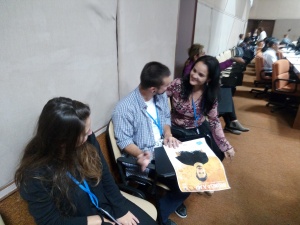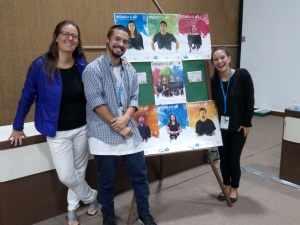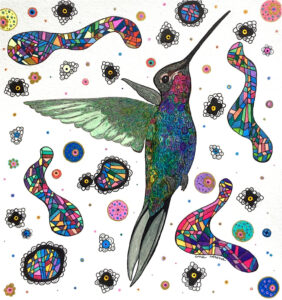By German Touron, Loreley Miraglio, Carolina Buceta, Judith Meresman
After a year of hard work, and thanks to the invitation of RIADIS and the support of UNFPA, we were able to travel to Havana to present our projects: Decimeloamí and CPCD 2.0, within the framework of the 6th Conference: «Inclusive Latin America in Unity, Development, Peace and Hope «, during March 14-16, 2017.
On the day of our arrival the organization waited for us at the airport and in a very friendly way we were transferred to the Hotel Palco. Already on Tuesday morning we had our credentials. During the conference Germán was “Argentine”, and Loreley was called “Lorelei Mirablio” and was Uruguayan!
The first cultural shock: in Cuba they call hot water what we consider to be natural water in South America … we realized this just when wanting to drink mate!

RIADIS is an organization that works in 16 countries of the region and gathers organizations formed by associations of people with disabilities and their families, and organizations that support the defense of Human Rights and promote the full and effective social inclusion of persons with disabilities.
For our project La Convencion 2.0 was attended by Carolina Buceta, from Argentina, and Judith Meresman from Argentina and Germán Tourón from Uruguay, along with Loreley Miraglio, for their «Decimelo a mi!» project.
Exhibitions
About 120 leaders from the three regions of Latin America, mainly from Cuba and the Caribbean, Central American countries and finally a few, as in our case, representing organizations from South America, participated in the conference.
 Like any big event, the Conference was an excellent opportunity but had its shortcomings. We noted a very active participation of all members of RIADIS, as well as ACLIFIM (Cuban Association of Limited Physical Engines). However, this overshadowed the participation of those who were not part of those two organizations, during the conference and the assembly.
Like any big event, the Conference was an excellent opportunity but had its shortcomings. We noted a very active participation of all members of RIADIS, as well as ACLIFIM (Cuban Association of Limited Physical Engines). However, this overshadowed the participation of those who were not part of those two organizations, during the conference and the assembly.
The various plenary tables were composed of representatives of civil society and international organizations. The methodology was almost entirely expository, and only in some cases was there room for questions from the public due to the lack of time.
Main topics presented
Some topics presented were:
- Universal accessibility (support systems, the Sign Language as a public policy for inclusion, etc.);
- Strategies for inclusive development and international cooperation (statistics and disability, political advocacy and effective leadership, etc.);
- Inclusive Education for sustainable development, where some good practices of inclusive education were presented in Latin America and the Caribbean and where, concretely, META presented its work: «Convention 2.0» in the table of Youth with Disabilities and «Decímo a Mi!» In the table of Sexual and Reproductive Education.
Before the presentation table of the project, we could be part of an activity where the axis to work was the labor inclusion. There we could circulate what worked for the youth in the workshops that were framed in the project of the convention, CPCD 2.0.
In these workshops, the issue of the right to employment is one of the most worrisome to young people. Therefore, the exhibition we chose focused on the barriers that the young men and women face when finding their first job.
Our presentations: signing autographs!
The presentations of our two projects were a success! Germán even signed autographs on his posters for Cuban interpreters!
The presentations were scheduled for Tuesday, but moved to Wednesday for organizational reasons. In the morning we showed the participants the video made by iiDi for Women’s Day, which had a big impact.
The presentations of our projects were on the same schedule, so unfortunately we could not support each other.
CPCD 2.0
 The presentation of the «La Convencion 2.0», was in the framework of a youth table. However, there was little of the public present. In general at the conference, we hardly encountered young people. Although there were few participants in the space, they were all very interested in the proposal.
The presentation of the «La Convencion 2.0», was in the framework of a youth table. However, there was little of the public present. In general at the conference, we hardly encountered young people. Although there were few participants in the space, they were all very interested in the proposal.
Decímelo a mí!
 The presentation of «Decímelo a mí» was very successful, with the participation of a large and interested public. We narrated the form of work in which we carry out the project, between 3 countries and at a distance; We discussed some particularities that we find in the workshops that we perform for adolescents of the deaf community; And we explained how we take advantage of the new technologies in favor of the inclusion and development of materials in Sign Language. We then showed videos about sex education carried out in the 3 countries.
The presentation of «Decímelo a mí» was very successful, with the participation of a large and interested public. We narrated the form of work in which we carry out the project, between 3 countries and at a distance; We discussed some particularities that we find in the workshops that we perform for adolescents of the deaf community; And we explained how we take advantage of the new technologies in favor of the inclusion and development of materials in Sign Language. We then showed videos about sex education carried out in the 3 countries.
Many of the people present approached us to ask for materials and more information, since while demonstrating the effectiveness of the project with the Augmented Reality, the technologies did not function properly. In Cuba internet connectivity, which is very important in these materials, is very deficient still. Nevertheless, the public was delighted with our productions in the three Sign Language, posters and postcards. The atmosphere of the presentation was very warm with great attention from the audience. Many are interested in replicating the projects in their own countries. During the time for questions and comments we received a compliment from one of the spectators: he said, «as a young group (META) had done more in four years than many other groups in twenty years.»
And young people?
Thursday had space for the Meeting of Young People, but the average age of the participants was very high. This shows how difficult it is to work with young people, to speak out, to empower people with disabilities and to open dialogue. We felt the lack of a young dynamic, of hearing the voice of the young people throughout the Conference, particularly in this instance.
In fact, this issue, in which META was going to work throughout the day, directly arose. At first we were a bit confused because it was not clear what had happened, but we organized to film interviews with young disabled people that we detected. We will incorporate these videos into our Convention project.
We believe that the lack of active young people within these organizations makes it difficult for adults and young people to interact with each other and, consequently, their needs remain unknown. It is vitally important that adults give the necessary place to the youth and their participation.
Despite this, the representatives of META have managed to make us a place, and to meet others who had stories to share. We met humble people with great value both from Cuba and neighboring countries and learned from their experiences.
Experience of exchanges
Throughout the Conference we managed to exchange with different countries interested in replicating our project. One of them was Cuba, so we took advantage of our stay in the country to contact Marisol, UNFPA representative from Cuba. We managed to meet her and show her the materials of both projects. Some organizations from Peru, Mexico, Bolivia and Brazil were also interested.
For META, the RIADIS Conference was a very good experience, since we were able to see ourselves through the stand, the video, and the materials of both projects. META’s proposal has an innovative work format, with valid content, accessible and friendly to the general public. As a group of young activists we come back convinced that we must continue this revolution.



